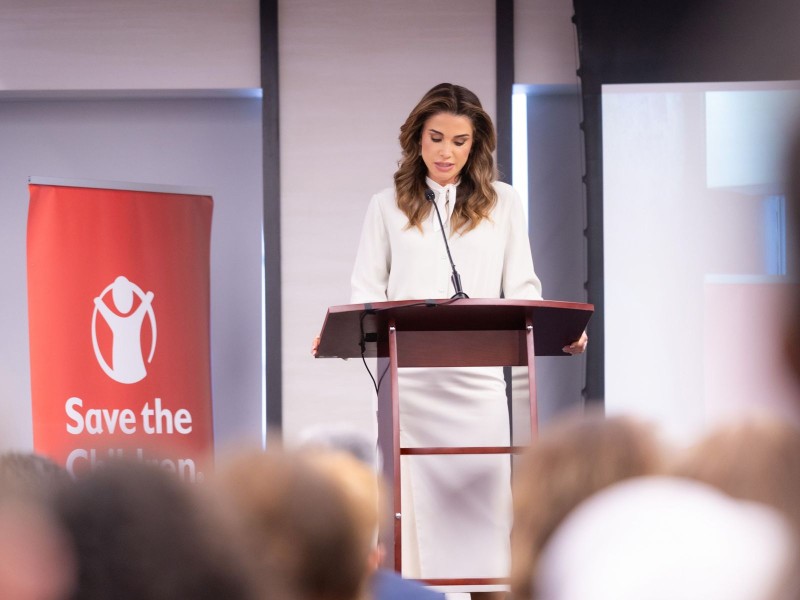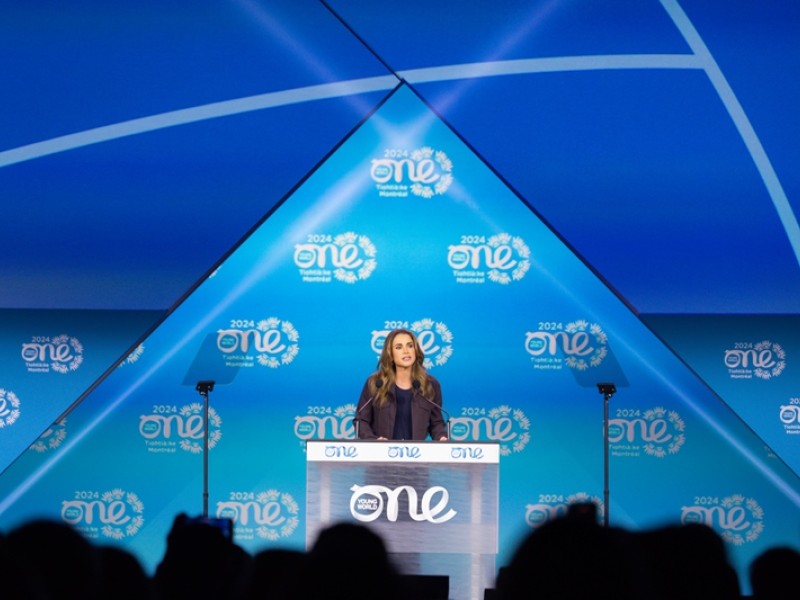Queen Rania's Acceptance Speech for the German Media Prize 2003 - Baden-Baden, Germany
2003 Deutscher Medienpreis - Baden-Baden, Germany
Your Majesty Queen Silvia [Queen of Sweden, co-recipient of 2003 German Media Prize],
Distinguished guests,
Herr Koegol [Mr. Karlheinz Koegel, Chairman of German Media Prize],
When I think of all the eminent people who have received this award, I am truly honored and touched to be standing in front of you as a recipient. And I am delighted to be here tonight. I am particularly proud to be sharing this stage with Her Majesty Queen Silvia.
Your Majesty, your unsurpassed devotion to the cause of protecting children--the most precious and yet the most vulnerable among us--has been an inspiration to me for many years, and a source of encouragement in my own work for Jordan’s children.
Together, I understand that we are the first women to receive the German Media Prize. It gives me great pride, on behalf of all Arab women, to be thus honored. I know how much Arab women are doing in Jordan and throughout the entire Middle East to make a difference in the lives of their families and their nations…and I know how much they bear the brunt of the chaos and conflict which blights so much of our region today. On their behalf, and in their honor, I sincerely thank you.
I must say, I am especially excited today to be back in Germany. It is only a few months ago that my husband and I were on our state visit to this wonderful country. A memorable visit that gave me the opportunity to experience first-hand the splendor of this country and the warm spirit of its people. After all, isn’t this kind of personal exchange what it’s all about? Beneath all the ceremony, official engagements, bilateral negotiations, and symbolic gestures, doesn’t it all come down to the basic face-to-face, one-on-one, personal exchange? The kind of interaction, that fosters long-term personal relationships born out of the knowledge that we have so much in common?
But what do we do when we do not have the opportunity to build these bridges of human understanding through first-hand interaction? The answer is simple: we turn to you. You in the media world are the guardians and guarantors of one of the most basic of human rights in the 21st century--the right to know. You are the ones to whom we turn to transport us to the furthest corners of our globe, to give us the real story behind the headlines, to fill in the gaps and to answer some of the more puzzling questions that confront us. And today, there are many such questions, many of them intricate and complex, many seemingly simple, yet apparently just as challenging to unravel.
As we mull over these questions, let us try to think back to a time when we took great pride in our ability to integrate our world to erase the borders that separated us, boasting an inclusive global economy, and marveling at our technologically-advanced planet.
Then we come back to the present and are rudely awakened by the realization that what we thought was a straightforward path towards globalization, was in fact, one intersected by unwelcome detours and barriers. The valued tools, on which we relied to bring about so much good, were equally accessible to the hands of evil. As our transparent borders facilitated the movement of trade and tourists, so too did they allow those who seek terror and destruction to seep through. As the vast wealth of information available broadened our horizons, so too was it used to the advantage of those who are perpetually narrow-minded.
Against such a solemn backdrop, is it realistic for us to rekindle the optimism that existed just a few years ago? Despite what the skeptics might say, I am optimistic. But first there are a couple of things we need to think about. For example, why is it that despite the fact that we are all so fundamentally similar, do we still insist on focusing the bulk of our time and attention on our differences? Nowhere is this more obvious that in the relationship between the West and the Islamic world. I say this because I have found that in our haste to fathom the ills of the world, we have found it much easier to adopt a rather simplistic and unfair characterization of each other, placing us at opposite ends of the spectrum and ignoring our stark commonalties.
Appreciating our common humanity through dialogue is a first step to bringing down the invisible walls that encircle our hearts and minds. And nowhere in the world is the importance of bringing down walls better understood than here in Germany. Unfortunately, in my part of the world, we are a little late in learning the valuable lessons of courage and resolve so clearly demonstrated by the German people almost 14 years ago. For even as we stand here talking about the integration of our world, new walls are being built in my region. And with their building, dreams are being shattered. Today, I must tell you honestly, many in the Arab world are nervously looking over their shoulders and feeling rather hopeless. The conflict between the Israelis and Palestinians has been allowed to fester for far too long, embittering hearts, placing innocents on the frontline, and poisoning our region as well as the rest of the world. Still this tension in our region threatens to be compounded by a potential war looming over Iraq.
In my part of the world, people are afraid. We all fear the unknown and we are profoundly uneasy realizing that our destiny is largely in the hands of forces out of our control. This fear and uncertainty hinders our ability to have trust in our future…
I admit that there are many days when it would be easy to fall prey to hopelessness and cynicism. Hopelessness, after all, absolves us from the responsibility of doing anything. But this apathy represents, I believe, the ultimate danger. People trapped by failed hopes and broken dreams cannot build a strong and dynamic future. Cynicism is a contagious disease. It can spread more rapidly than the plague and can be equally as devastating. We have come too far to give up now in our efforts to build bridges and tear down walls.
Walls, after all, do not belong in a century that has no place for zero-sum games. Today, there is no such thing as absolute power, complete domination or total victory. In this day and age, success can only be achieved through win-win scenarios, through negotiation, mutual understanding and compromise. Our shared fate means that we can either all win together or all lose together.
A full appreciation of this togetherness can provide the seedbed from which a common value system can take root and grow. And no one plays a more important role in driving this message home than you in the media world. At a time when many are immobilized by fear, vulnerability, or sheer cynicism, you are relentless in your determination to report and document the daily stories of our common humanity.
We need only remember courageous truth seekers like Raffaele Ciriello, an Italian news photographer killed last March during fighting in the West Bank. His last photos in Corriere della Sera of Milan showed tanks and fire and streets aflame with violence--and then, suddenly, a baby, with beautiful eyes, staring curiously into the camera still holding out the hope that she may some day be looking at a better world.
Ciriello was one of more than 50 journalists who died last year in the line of duty. These were people who knew that the essence of their profession is connecting, informing and explaining, even if it cost them their lives. Despite all the technological tools available to us, it still takes the hands, the mind and, most importantly, the heart of a good journalist to really capture the truth.
It is heroes like Ciriello who reassure us that there is still much room for hope in our world. We can take pride in the everyday miracles occurring in the slums of Rio de Janeiro where street children are seeing hope and kindness for the first time through of the efforts of Her Majesty Queen Silvia.
And there are many such heroes who come from my part of the world. It so happens, that the one dearest to my heart stood here five years ago, receiving the same honor I receive today. King Hussein was a man who personified all the values that we aspire to. He dedicated his life to the relentless pursuit of peace. He emboldened the champions of good, just as he fought the voices at the extreme. He always insisted on holding on to his idealistic vision, even when the cynics said that this vision was unattainable. And in so doing, he made Jordan what it is today--a nation of open minds, moderate voices and courageous actions.
Yesterday, as we marked the fourth anniversary of his passing, we knew that his moral passion and wisdom would continue to embrace our nation for years to come.
As we attempt to map the inspiring legacy of King Hussein firmly into our future, we must always work hard, keep the hope alive, continue the dialogue, and of course, back it all up with plenty of good old-fashioned media coverage.
Thank you very much…
Featured
Queen Rania's official website
This website does not support old browsers. To view this website, Please upgrade your browser to IE 9 or greater
Your browser is out of date. It has known security flaws and may not display all features of this and other websites. Learn how to update your browser



